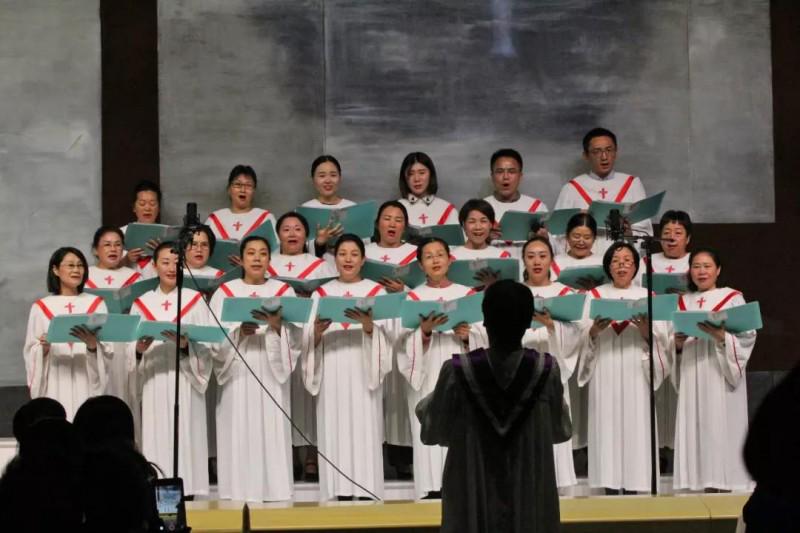Recently, the platform Johnson-Johnson once again invited Pastor Luo Liguang, former president of Jiangxi Christian Association and director of China Christian Worship Music Committee, to give a special lecture on worship music.
In the lecture, Pastor Luo reviewed the course of his life’s commitment to the worship music ministry, and told of the success or failure of his creation and leading the choir class. He summed up the key points to be followed in the creation of sacred music and the significance of the sacred music ministry.
At the beginning of the lecture, Pastor Luo started with his experience of composing a hymn for his father when he was 16 years old and introduced how he embarked on the road of worship music service.
As early as a teenager, Pastor Luo showed his talent in music performance and composition, and he composed many songs and operas on campus. In 1960, after graduating from high school, Pastor Luo took a violin and some music books and left his hometown of Shandong to work in Jiangxi.
On the first day of his arrival in Jiangxi, Pastor Luo created two hymns, “Can’t Leave the Lord” and “Strive to Run for the Heavenly Road” for self-encouragement. Later, in the 1960s and 1970s, although he was tempered by his faith, Pastor Luo continued to get close to the Lord through the hard times by relying on scriptures and poems in his memory.
After the church was resumed in the 1980s, Pastor Luo began to compose music by himself. In 1994, 211 hymns were composed, created, and collected into a book, all of which were dedicated to the CC&TSPM in Jiangxi Province. Later, CC&TSPM in Jiangxi Province invited Bishop Shen Yifan to preface and officially publish them, and the collection of hymns was named Short Songs of Bible Verses.
Since 1997, Pastor Luo served as the president of Jiangxi Christian Association, and then as the pastor in charge of Yushui Church in Xinyu. In addition to pastoral ministry, Pastor Luo composed a number of hymns with the harmony of the published simplified version of Bible verses and poems and later established the Yushuitang Choir.
In the second part, Pastor Luo shared his experience in the creation of sacred music and choir leadership, combining his three areas of ministry experience of studying harmony arrangement, creating his own hymns and leading the choir:
Pastor Luo recalled that it had always been his long-cherished wish to arrange harmony for scripture hymns. At that time, due to the lack of professional teachers in harmony allocation, Pastor Luo longed for knowledge about chords from the score of hymns, from major triads to minor chords, to changing chords, major chords, and minor chords. He studied one by one first, and then imitated and created.
Pastor Luo said, "If you want to learn the creation of harmony, it is far from enough to rely on self-study, or you should receive formal and systematic music education."
Then, after reviewing the creation process of the three sacred hymns, Pastor Luo concluded, on the one hand, the creation of the lyrics of sacred hymns should be combined with the creation situation, obeying the influence of the Holy Spirit; on the other hand, it is necessary to express the creator’s true feelings. It is also very important to learn Chinese vocabulary and grammar so that the creators’ true feelings can be expressed with more appropriate words.
With the help of the pastor of Lanzhou Church, Pastor Luo learned how to use the computer software “Overture” to make his own score. Later, he used this method in the training of choir co-workers in Yushuitang. In his view, the process of composing, harmonizing, and arranging music was simplified with the help of self-composing music by software.
In the creation of contemporary mainstream music, lyrics, composition, arrangement, singing, and mixing have already become a consensus process. Among them, the arrangement is based on the existing music materials, such as the arrangement of singing forms, harmony and accompaniment. In the church, it is necessary to integrate arranger technology into the creation of hymns.
Finally, Pastor Luo showed the creation process of hymns: following the Holy Spirit's prompting to determine the theme, writing lyrics, preparing melody-arranging, harmony-arranging arrangement-making MIDI, practicing in the choir, recording, post-mixing production, singing, and publishing. In sharing, Pastor Luo once again emphasized the importance of educating staff in grass-roots poetry classes.
(The article is originally published by the Gospel Times.)
-Translated by Charlie Li












